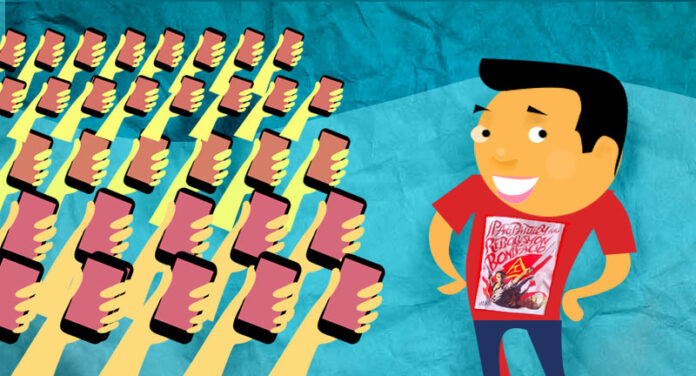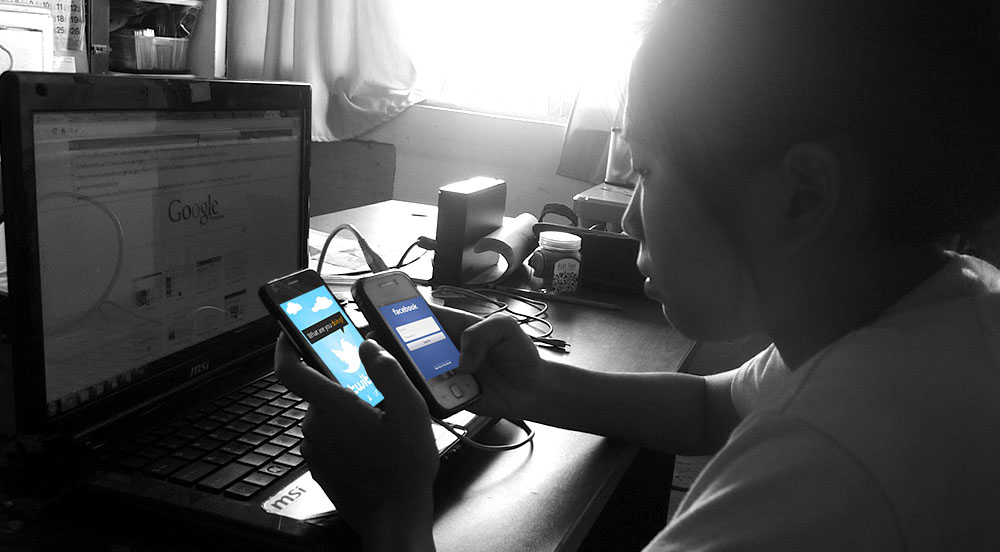I have a cell phone which I use for calling, texting, and taking photos. Sometimes it’s also my alarm clock. That’s all. I never use my phone to download apps or interact with my virtual networks because I don’t have an Internet subscription. Even if there’s a WiFi connection, I rarely go online using my phone. When Smart offered free Internet to its prepaid subscribers (yes, I’m a former congressman who uses prepaid), I accessed it only twice or thrice to check my Twitter feed or read news updates.
Yet I’m all over the cyberspace. I am a blogger and social media enthusiast. I am stalkable via Plurk, Tumblr, Shelfari, and recently I joined Ello. I am an avid Twitterer and Facebooker (Have you liked my fan page yet?). But I do not have an Instagram. I wanted to join it but it requires mobile Internet access.
What then are my reasons for my refusal to apply for mobile data subscription? To be candid, I wanted to save money. I thought that hard-earned cash, even if it involves a few hundred pesos, is better spent on other essential goods. Besides, it’s not as if I will be cut-off from the online world. I have Internet access at home and that is enough, for the moment.
Some friends tease me that I risk being left behind on news and other realtime updates. That’s true but it doesn’t matter. My life will not end if I fail to read about a breaking news incident minutes after it happened. There’s always the late night news; and didn’t I mention that I have Internet access at home?
I always waste 12 hours of my life wandering in the streets of the real world while online news, gossip, and chatter are buzzing; but I can quickly digest all the fun tidbits I missed in a matter of minutes when I get home in the evening. Or I can catch up with the news in the morning through TV, radio, or the ever reliable laptop.
[quote_center]I don’t need to hear or read the news as it happens. For the longest time, man survived even if they didn’t learn the truth of their existence at the proper time.[/quote_center]
I don’t need to hear or read the news as it happens. For the longest time, man survived even if they didn’t learn the truth of their existence at the proper time. In the 20th century, we went to school or work in the morning and watch the news in the evening. Revolutions succeeded even if instant information was not yet available.
They say mobile Internet makes us more productive and efficient. I agree but it doesn’t mean we become less productive and efficient if we don’t have a smartphone connected to the Internet.
In the context of Metro Manila, what’s the use of a traffic app when all the streets are semi-parking lots? Just travel one hour earlier to reach your destination. Weather? We only have wet and dry season and the sun is always up. If there’s a storm coming, trust me, everybody will tell you about it.
E-books? Fine, smart choice. But I prefer reading printed books; it’s safer and it saves the battery life of my phone. Plus you are allowed to open and read a book inside banks, bayad centers, airplanes, embassies, and other high-security places. They won’t mind even if your book is about terrorism.
I admit I almost got lost in the streets of San Francisco and London in the past month because I didn’t have a mobile map app. But I survived through old school tactic: talking to people and asking for directions. Indeed, there are lunatics out there who might give the wrong advice or geographical idiots who pretend to know more. But I have greater faith in the good of humanity. And even if I got lost, I can always turn around or ask another human being. That’s life. And isn’t it more fun?
After Snowden, we now know that there are worse lunatics listening and monitoring our virtual footprints. To disconnect from the Internet, even for a few hours, is a symbolic and sometimes practical method to protect our privacy and security. This is a non-issue to many people but crucial to activists and dissidents. Actually it should be everyone’s concern because privacy and even anonymity is a precious democratic right. Our schools and institutions should not simply teach our kids how to use their gadgets, but also when to stop and why they should stop using these tech tools from time to time. Unlimited Internet is costly, dangerous, and inhuman.
[quote_center]Unlimited Internet is costly, dangerous, and inhuman.[/quote_center]
Perhaps I’m a sentimentalist. There are only few hours in a day when it’s lawful and acceptable to mingle with other people and so why use this opportunity to finger your phone? Can’t you do it later?
If you are a shy person (I would caution the use of the word introvert, which is different from shyness), you can derive pleasure in the company of other living things without socializing. Simply observe their traits, their oddities, feel the presence of the moment, nod, smile, speak a few words, then retreat to a safe distance where you can see everybody – but stop the incessant tapping of your phone since a) it’s impolite; b) you will never improve your people skills; and c) you will fail to validate your secret theory that everyone in the universe is petty and vain.
I’m always online, responding to emails, reading blogs, writing news; and while inside the office I’m still sitting in front of a computer. I want a few hours of space away from the cyberspace. I want time that is not realtime. Sometimes I want to be a lurker not on Facebook but in trains, buses, corridors, theaters, malls, and absorb all the combined wisdom and inanities of the communities I visit.
[quote_left]I want to appreciate a street scene or a countryside vista and respect its uniqueness by simply storing it in my memory.[/quote_left]I want to appreciate a street scene or a countryside vista and respect its uniqueness by simply storing it in my memory. I want to look back at my life not by browsing digital files but by harnessing the power of remembering. I want to make friends who will spend time with me and value my companionship even if our activities are not documented on Facebook. No photo, no video, no status update can faithfully record and describe the ultimate joy of holding your firstborn in your arms.
I’m an advocate of slow blogging. Applied to social media, I prefer to share my thoughts after a brief time has passed. I admire sensible ranters and livebloggers; we need them and they improve online discourse. People like them make mobile Internet a valuable tool. But there are also netizens like me who interact with friends and enemies in the morning and write about these friends and enemies in the evening. I like to make news in the morning and read the news (plus the vitriolic comments) in the evening. I like to be part of an initiative that creates hashtags rather than simply joining a hashtag bandwagon. I like to create history rather than reading or tweeting about it. Or if I were a hippie, I’d say spread love in the morning and make love in the evening.
But the age of mobile Internet has already arrived. It is now the new normal. I was almost tempted to partake in the fun when my high school classmates told me that all of them are now on Viber. As free communication apps continue to proliferate, there will be fewer reasons to reject the allure of Internet-on-the-go, especially for people like me with overseas relatives. Like all popular technologies that preceded it such as TV, computer desktop and texting, the use of mobile Internet will be ubiquitous in society.
One day, and that day may come soon, I will probably apply for mobile Internet. But in the meantime, I am holding my ground. The pressure is mounting but I can always rebuff my friends in Manila by arguing that it’s illogical to pay more when the web service of our local telcos is super slow and erratic. Another reason to delay the inevitable.

































